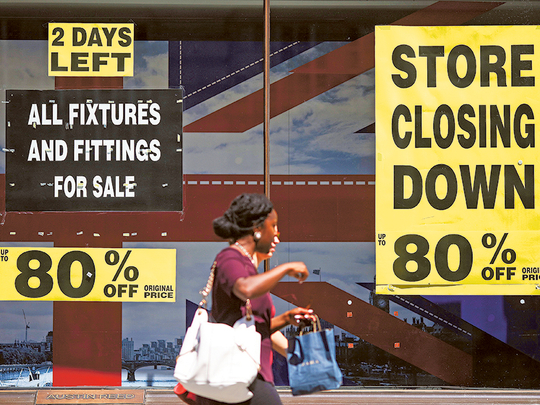
London: The UK economy may be heading for its first recession since 2009, with economists slashing their forecasts in the wake of the Brexit vote and now seeing two quarters of contraction this year.
While the 0.1 per cent decline in gross domestic product anticipated in each of the third and fourth quarters is modest, it will mark the end of more than three years of unbroken growth. The projections in the Bloomberg survey compare with a 0.6 per cent expansion predicted for those periods before the June 23 referendum.
The changed outlook since the UK voted to leave the European Union has the Bank of England — which had been on a slow track toward interest-rate increases — now contemplating expanding stimulus for the first time since 2012. While the impact is only showing up so far in measures of consumer and business confidence, that could ultimately spill over into key drivers of growth in the coming months, stymieing the economy.
Even with some predicted BOE stimulus, the probability of Britain sliding into its first recession since 2009 stands at 40 per cent, up from 18 per cent in June, according to the survey, which was conducted after the central bank’s July 14 policy announcement. That’s the highest since Bloomberg started tracking the likelihood in 2012.
“We expect to see a recession around the turn of the year, based on the idea that there will be quite a large uncertainty shock which will lead to corporate retrenchment,” said Nick Kounis, head of macroeconomic research at ABN Amro Bank NV in Amsterdam. BOE policymakers “need to wait for a little bit of evidence but they can’t wait until it has already happened because monetary policy works with a lag.”
Governor Mark Carney has indicated that some easing may be required, and the majority of economists surveyed predict the BOE will respond to the slowdown with one interest-rate cut of 25 basis points before the end of the year, taking the already record-low rate to 0.25 per cent. The central bank will also boost its quantitative-easing program, currently £375 billion ($494 billion), by £10 billion in August, according to the median estimate.
The BOE’s next policy announcement is August 4, when the Monetary Policy Committee will also publish new growth and inflation forecasts. Officials have said sterling’s sharp drop will put upward pressure on short-term price growth, though they have differing views on the medium term, which will play a part in their debate on whether to loosen policy.
There may be some opposition within the MPC to quick action. Policymaker Kristin Forbes wrote in the Telegraph newspaper that there’s no need to hurry to add stimulus, citing a moderation of the market turmoil since the vote, calm consumers and “quite solid” growth before the referendum.
“Until more hard data is available, I believe this is a good time to ‘keep calm and carry on’,” she wrote.
Even without hard data, some companies are expressing concern. Howden Joinery Group, a London-based maker of kitchens, said Thursday that the referendum result means there is “clearly a heightened degree of uncertainty as to how demand in the rest of the year will pan out.” Airline easyJet Plc said that Brexit-related currency volatility was impacting consumer confidence.
Citing its network of economic agents, the BOE said on Wednesday that while it’s currently “business as usual” for most firms, around a third of contacts thought there would be “some negative impact” over the next twelve months.
The International Monetary Fund this week slashed its UK outlook, as well as its global forecasts, saying Brexit implies a “substantial increase in economic, political, and institutional uncertainty.”
Economists in the Bloomberg survey cut their 2016 growth projection to 1.5 per cent from 1.8 per cent and 2017 to 0.6 per cent from 2.1 per cent. The latter would be the weakest since 2009, when the economy last suffered a full-year contraction. Inflation is seen averaging 2.2 per cent next year, just above the BOE’s 2 per cent target, and up from 1.7 per cent forecast in June.
BOX
UK’s Hammond says improved borrowing figures show strength of the economy
LONDON: British finance minister Philip Hammond welcomed official figures on Thursday showing public borrowing falling by a greater than expected amount, saying it showed the underlying strength of the economy. Public borrowing in June fell to 7.8 billion pounds from 10.0 billion a year earlier, a much bigger fall than the drop to 9.2 billion which economists had forecast.
“These public finance figures highlight the underlying strength of the British economy,” Hammond said. “Ahead of the referendum, monthly borrowing continued to fall, with the deficit in June the lowest it has been since 2007.
“As our economy now adjusts to reflect the (EU) referendum decision, it is clear we will do so from a position of economic strength.”
-Reuters












